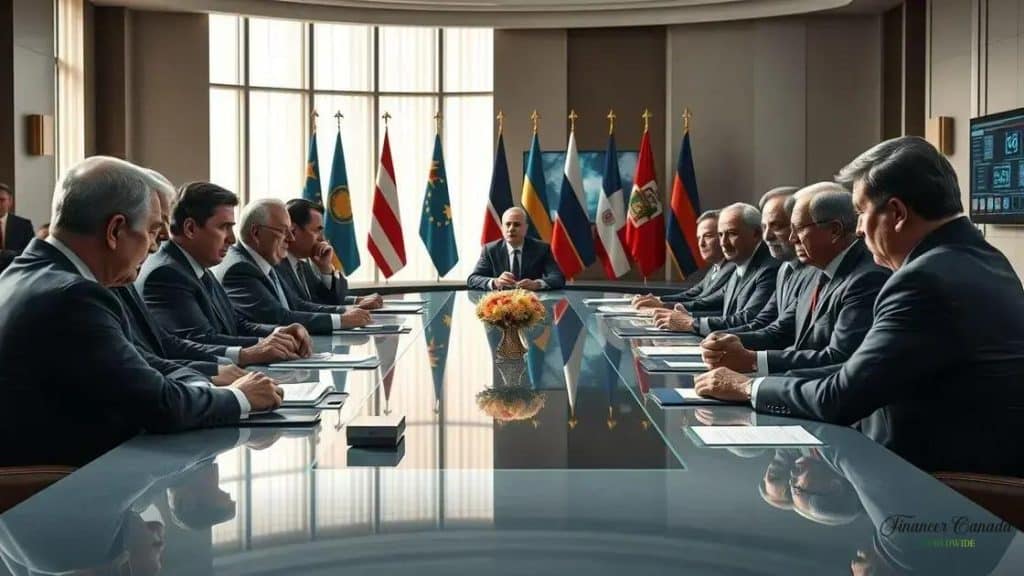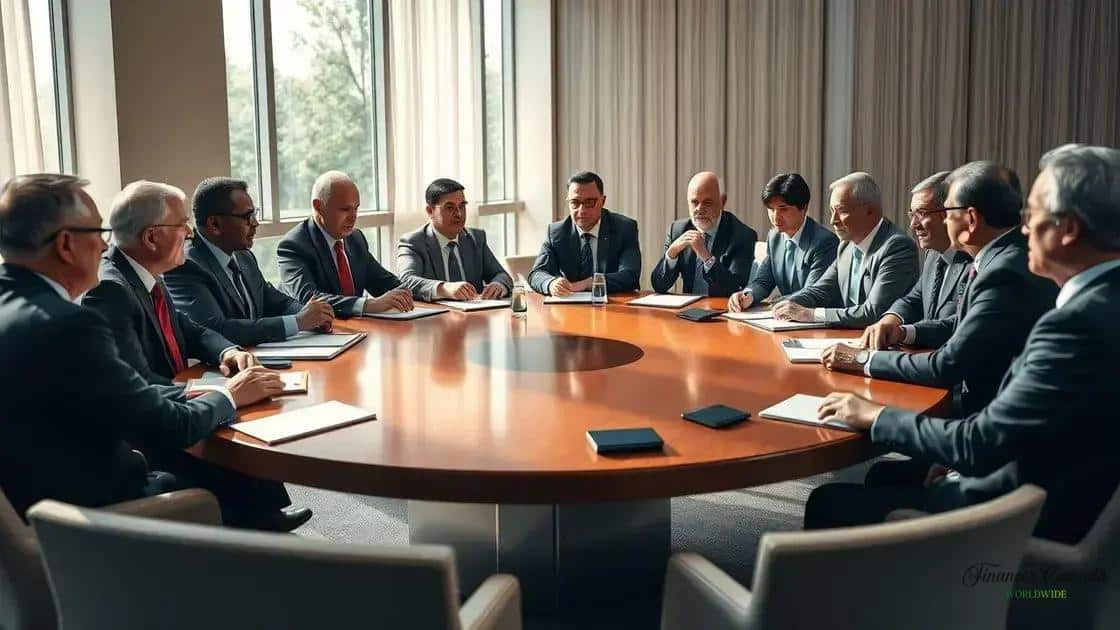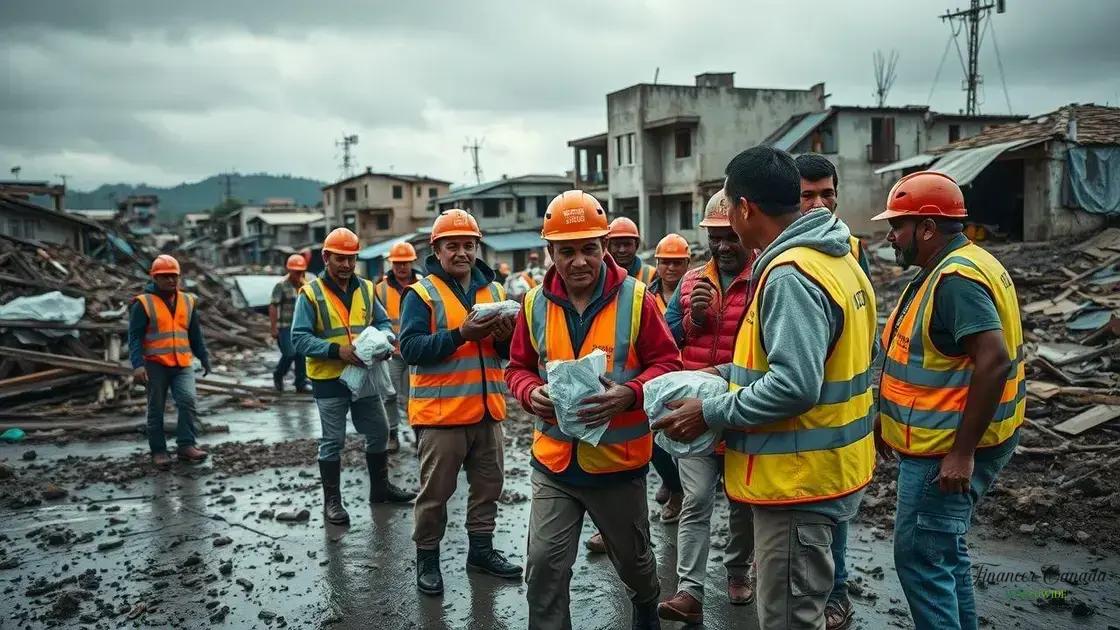How global conflicts are reshaping international relations

The future of international alliances involves adapting to global challenges through collaboration, leveraging technology, and navigating political changes to ensure security and stability among nations.
How global conflicts are reshaping international relations is a complex yet fascinating topic. Have you ever wondered how these conflicts can influence trade, security, and global cooperation? Let’s dive in to understand these shifts.
Understanding the dynamics of global conflicts
Understanding global conflicts requires examining various factors that contribute to their evolution. Conflicts often entail a complex interplay of politics, economics, and cultural differences.
One key aspect is the emergence of national interests. Nations often prioritize their own economic and security needs, leading to tensions with others. This can escalate into conflicts that disrupt international relations.
The impact of geography
Geography plays a vital role in shaping conflicts. Natural resources, border disputes, and strategic locations can heighten tensions. For example, countries rich in resources may face conflicts from nations seeking access to those resources.
- Territorial disputes, like those in the South China Sea.
- Access to water sources in arid regions can become a source of conflict.
- Competition for energy resources impacts foreign policy.
Another dimension is the ideological divide that often fuels conflicts. Differing political systems and beliefs can lead to misunderstandings and mistrust among nations. For instance, ideological differences during the Cold War significantly influenced global relations.
Additionally, economic factors cannot be overlooked. Economic sanctions, trade disputes, and competition for markets often stir tensions. Nations may resort to conflict to protect their economic interests.
Humanitarian considerations
In the midst of conflicts, humanitarian issues arise, drawing international attention. The plight of civilians can lead to intervention by other countries, further complicating the situation.
- Human rights violations often trigger global outrage.
- Refugee crises can destabilize entire regions.
- International organizations strive to mediate and resolve conflicts.
As we delve deeper into exploring global conflicts, it becomes clear that their dynamics shape not only international relations but also the future of global stability. Understanding these conflicts is essential for fostering peace and cooperation among nations.
The role of diplomacy in conflict resolution

The role of diplomacy in conflict resolution is crucial in today’s interconnected world. Nations often face challenges that can escalate into conflicts, and effective diplomacy can help prevent these situations from worsening.
When countries engage in diplomatic dialogue, they can explore solutions without resorting to violence. This engagement involves negotiating, mediating, and sometimes even compromising to achieve peace.
The importance of negotiation
Negotiation is a fundamental aspect of diplomacy. It allows conflicting parties to express their interests and concerns. By doing so, they can find common ground that satisfies both sides. For instance, negotiations during the Camp David Accords resulted in a framework for peace between Israel and Egypt.
- Establishing trust between countries is vital for successful negotiations.
- Third-party mediators can assist in facilitating discussions.
- Clear communication prevents misunderstandings that could lead to escalations.
In addition to negotiation, effective communication is key in diplomacy. Each country has its own language, culture, and perspective, which can lead to misinterpretations. By openly and respectfully communicating, nations can foster better relationships.
Moreover, diplomacy often involves addressing root causes. For example, economic instability and social injustice can lead to conflicts. By tackling these issues through diplomatic means, countries can reduce tensions and build a foundation for lasting peace.
The role of international organizations
International organizations, such as the United Nations, play a significant role in diplomatic efforts. They provide a platform for dialogue and collaboration among nations. These organizations can facilitate discussions that might not occur otherwise.
- Peacekeeping missions can help stabilize regions after conflicts.
- Resolutions passed by international bodies can guide nations toward peaceful solutions.
- Humanitarian aid during conflicts is often coordinated through these organizations.
As we consider the role of diplomacy in conflict resolution, it is evident that diplomacy’s power lies in its ability to resolve differences peacefully. Promoting open communication, encouraging negotiations, and leveraging international support are all essential components to maintain global stability.
Trade implications of international disputes
International disputes often have significant trade implications that can affect economies worldwide. When countries face conflicts, they may impose tariffs, quotas, or sanctions that disrupt normal trade relations.
For example, a dispute over territory might lead to one country imposing trade restrictions on another. These restrictions can have far-reaching effects on global supply chains, leading to increased costs and delays for businesses.
The impact of tariffs
Tariffs are one of the most common responses during trade disputes. They act as a tax on imports, making foreign goods more expensive for consumers. This can lead to a decrease in imports and impact domestic markets.
- Increased prices for consumers can result from higher tariffs.
- Domestic producers may gain an advantage, but the overall market may suffer.
- Retaliatory tariffs can escalate trade tensions even further.
Another consequence of international disputes is the uncertainty for businesses. Companies may hesitate to invest in countries where conflicts arise. This lack of confidence can slow economic growth and innovation.
Trade agreements may also be at risk. Existing agreements can be put on hold or even terminated during disputes, affecting long-term economic partnerships. Countries often seek to protect their interests, which can hinder collaboration.
Regional impact of disputes
International disputes can have a significant regional impact as well. When one country imposes trade restrictions, neighboring countries may also feel the effects. This can lead to economic instability in regions, affecting jobs and livelihoods.
- Supply chains that cross borders may face disruptions.
- Smaller nations often suffer disproportionately from the fallout of larger disputes.
- Global markets can react negatively to regional instabilities, impacting investment.
Understanding the trade implications of international disputes is vital for policymakers and businesses alike. Being aware of how conflicts can influence trade can help mitigate risks and foster more stable economic relations around the world.
Humanitarian crises and global responses

Humanitarian crises around the world often elicit urgent global responses, reflecting the interconnected nature of our societies. These crises can arise from various issues such as armed conflicts, natural disasters, and widespread poverty. In many cases, the international community feels compelled to intervene and provide support.
One of the primary ways the global community responds is through humanitarian aid. This support can take many forms, including food, medical assistance, and shelter for those affected by crises. For instance, during natural disasters like earthquakes or hurricanes, humanitarian organizations mobilize quickly to deliver essential services to affected populations.
The role of international organizations
International organizations, such as the United Nations (UN) and the International Red Cross, play a vital role in coordinating humanitarian responses. These organizations can mobilize resources and coordinate efforts among various nations and non-governmental organizations (NGOs).
- They assess needs on the ground and allocate resources efficiently.
- Collaboration among multiple groups enhances the effectiveness of the response.
- They advocate for the rights and needs of affected populations.
However, global responses to humanitarian crises are not without challenges. Political factors can complicate aid delivery. Sometimes governments restrict access to certain areas due to ongoing conflicts or political agendas. This can hinder the efforts of humanitarian organizations trying to provide support.
Furthermore, public awareness and funding also play crucial roles. Global responses rely heavily on donations and international support, which can fluctuate based on public interest. When crises gain media attention, donations often increase, demonstrating how public perception can influence the level of humanitarian aid.
Long-term solutions
While immediate response is critical, there is also a need for long-term solutions that address the root causes of humanitarian crises. Investing in development programs that focus on improving education, infrastructure, and healthcare can help prevent future crises.
- Empowering local communities is key to building resilience.
- Sustainable development helps reduce dependency on aid.
- Supporting governance and stability can create lasting peace in conflict-affected areas.
In conclusion, the world faces numerous humanitarian crises that demand coordinated global responses. The effectiveness of these responses hinges on international collaboration, adequate funding, and a focus on sustainable solutions to prevent future emergencies.
The future of international alliances
The future of international alliances is crucial as global dynamics continue to shift. As nations face evolving challenges such as climate change, terrorism, and economic instability, the importance of strong alliances is more apparent than ever.
Countries are finding that traditional alliances may not always address new global issues effectively. Therefore, they are looking for ways to adapt and strengthen their partnerships. This evolution often leads to the formation of new alliances that focus on specific shared interests, such as security collaborations and economic partnerships.
The rise of regional alliances
Regional alliances have become increasingly significant as nations strive for greater cooperation within their regions. These alliances allow countries to address issues that pertain specifically to their geographical context. For example, the European Union promotes political and economic collaboration among its members.
- Regional security pacts can strengthen defense against common threats.
- Collaborative economic initiatives can boost trade among neighboring countries.
- Shared cultural ties can enhance diplomatic relationships.
Additionally, technology is playing a vital role in shaping the future of alliances. The digital landscape has made it easier for countries to communicate and collaborate. Nations can now work together on cybersecurity, data sharing, and tackling misinformation.
Challenges to traditional alliances
Despite the benefits, traditional alliances face challenges that can impact their effectiveness. Political changes, such as elections or shifts in leadership, can alter a country’s foreign policy and affect its commitment to alliances.
- Economic pressures may lead nations to prioritize national interests over alliances.
- Polarization within countries can affect international cooperation.
- Differences in values and priorities can strain relationships.
As countries navigate this complex landscape, the potential for forming innovative alliances remains. These alliances could focus on emerging issues like climate change, where collaboration is essential for global sustainability. By uniting efforts, countries can develop effective strategies to combat environmental challenges.
In conclusion, understanding the future of international alliances involves recognizing the need for adaptation and innovation in response to global challenges. As nations continue to develop new partnerships, the ability to collaborate effectively will be key to addressing pressing issues on a global scale.
The future of international alliances is crucial in responding to global challenges. As nations adapt to threats like climate change and conflicts, they are forming new partnerships. It’s clear that collaboration is essential for addressing issues effectively.
By understanding the dynamics of these alliances, countries can work together to promote security and stability. Continuous dialogue and innovation will shape these relationships in the years to come.
FAQ – Frequently Asked Questions about the Future of International Alliances
Why are international alliances important for countries?
International alliances help countries collaborate on global challenges, promoting peace and stability.
What are some examples of regional alliances?
Examples include the European Union and the African Union, which focus on regional cooperation and unity.
How do political changes affect international alliances?
Political shifts can alter a country’s commitment to alliances, impacting cooperation and collaboration.
What role does technology play in modern alliances?
Technology enhances communication and collaboration between countries, making it easier to work together on global issues.





